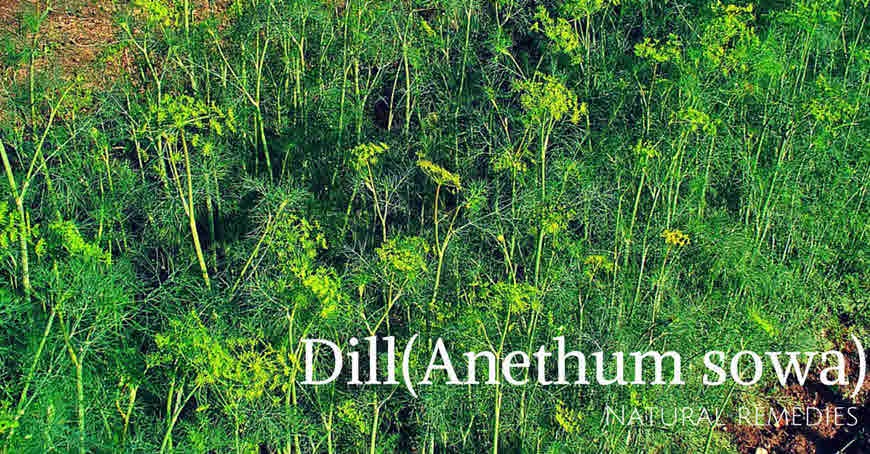Dill is known by many other names such as Garden Dill, Dilly, Dill weed, etc. The name Dill is derived from Old Norse word dilla, which means ‘to lull’. The seeds of the plant are used as spice and leaves as condiment for flavouring and seasoning of various foods. It is a plant with medicinal properties and used in various traditional medicine systems for the treatment of diseases for hundreds of years.

In Ayurveda, it is used for treating digestive troubles, colic and impaired digestion. This plant is mentioned in ancient Ayurvedic treatise as shatapushpa. Acharya Charak prescribed the paste of shatapushpa with alsi/flax seed and castor seeds pounded in milk for external applications in rheumatic and other swellings of joints. It is an ingredient in various Ayurvedic medicines such as Dhanwantharam Thailam, Valiya Narayana Thailam, Nimbasavam, Gorochanadi Vati, etc. In Unani medicine system, Dill is used for the treatment of digestive problems.
Latin name: Anethum sowa Roxb. ex Flem. (Indian Sowa) Synonym: A. graveolens Linn. var. sowa Roxb. A. graveolens DC Peucedanum sowa Roxb. Peucedanum graveolens Benth.
- Family: Umbelliferae;Apiaceae
- Sanskrit: Shatapushpa
- Bengali: Suva, Sulpha, Shulupa, Sowa
- English: Indian Dil Fruit
- Gujrati: Suva
- Hindi: Soya, Sova
- Kannada: Sabasige
- Marathi: Badishep, Shepa, Shepu
- Punjabi: Soya
- Tamil: Satakuppa
- Telugu: Sadapa
- Urdu: Shibt, Soya
Dill or Soya Plant
Dill plant is up to 90 cm tall, with slender stems and alternate leaves finally divided three or four times into pinnate sections;flower yellow, develops into umbels;fruits oval, compressed, winged about one-tenth inch wide, with three longitudinal ridges on the back and three dark lines;Propagation is through seeds.
Ayurvedic properties and action
- Rasa (Taste): Tikta/Bitter, Katu (pungent)
- Guna (Characteristics): Snigdha/Unctuous,
- Virya (Potency): Ushna/Hot
- Vipaka (Post Digestive Effect): Katu/Pungent
- Action: Stimulates appetite, Kapha-hara, Pitta-hara
Medicinal uses of Dill
Dill has antibacterial, antiseptic, antispasmodic, cardio depressant, carminative, digestive, diuretic, blood sugar lowering, blood pressure lowing, breast milk stimulating, and laxative properties. For the medicinal purpose its seeds, leaves and roots are used. The recommended dose of its seeds are 1/2-1 teaspoon for chewing;and 2 teaspoon seeds for soaking in cup of water.
Dill seeds infusion is prepared by soaking seeds in boiling water. Two teaspoon of crushed seeds are soaked in one cup of boiling water. This is steeped for 10-15 minutes to prepare infusion.
The leaves infusion is prepared by soaking one teaspoon dried or 3 teaspoons of crushed fresh leaves to 1 cup of boiling water. This is steeped for 10-15 minutes to prepare infusion.
Improving breast milk quantity: Boil a handful of Dill leaves or seeds in two cups of barley (jau) water and drink daily.
Bad breath, halitosis: hewing the seeds improves bad breath.
High blood pressure: Take equal quantities of dill seeds and fenugreek seeds and powder them and store it in a bottle. Take two teaspoonful of this powder twice a day with a glass of water.
Insomnia: or sleeplessness, decoction of dill seeds are useful. Decoction is prepared by boiling 2 teaspoon seeds in one cup water for a few minutes. This filtered and taken.
Improving appetite, upset stomach: Prepare Dill tea and drink.
Delaying mensuration: Crush dill seeds (2teaspoon) and soak in one cup hot water for 5 minutes. Filter and drink.
Painful menstruation: Dill is useful in managing painful menstruation.
Abdominal gas, pain in abdomen, Sleeplessness: Take seeds of Dill. Grind them to make powder. Soak one teaspoon of this powder in one glass boiling water for five minutes and drink.
Cough, loss of appetite: Clean and dry the leaves. Grind them to make powder. Take 1-2 teaspoon powder with one glass hot water.
Joint pain, arthritis: Make paste of Dill roots and seeds. Steam the paste and apply lukewarm on the affected area. Keep for half hour.